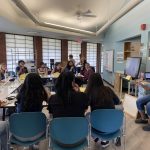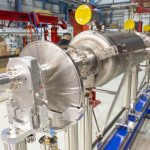From Physics World, March 6, 2023: The MINERvA experiment at Fermilab has been used to study the structure of the proton using neutrinos. Teijin Cai and colleagues working on Fermilab’s MINERvA experiment have showed how information about the proton can be extracted from neutrinos that have been scattered by the detector’s plastic target.
News
From University of Virginia Today, March 7, 2023: University of Virginia physicists shipped its last truckload of five large, specialized panels that contain the detector that will form the shell of the international Muon-to-electron Conversion Experiment, or Mu2e experiment. UVA professors, technicians, postdoctoral fellows, graduate students and undergrads have worked on a total of 83 detector modules, each weighing as much as 2,000 pounds, totaling about 160,000 pounds of materials.
From New Scientist: New Scientist presents a new series featuring experts at the leading-edge of scientific discovery. The series includes prize-winning astrophysicist John Mather who discusses the groundbreaking operations of the James Webb Space Telescope. Also, Fermilab senior scientist Don Lincoln explores how Fermilab has taught us so much about our universe, future research plans and how research results aid theorists in their quest for a ‘Theory of Everything’.
From University of Virginia Today, March 7, 2023: University of Virginia physicists shipped the last truckload of five large, specialized panels that contain the detector that will form the shell of the international Muon-to-electron Conversion Experiment, or Mu2e experiment. UVA professors, technicians, postdoctoral fellows, graduate students and undergrads have worked on a total of 83 detector modules, each weighing as much as 2,000 pounds, totaling about 160,000 pounds of materials.
From Amazon Web Services blog, March 7, 2023: The new Quantum Instrumentation Control Kit (QICK) developed by Fermilab and U Chicago engineers proved to drastically improve quantum computer performance while cutting the cost of control equipment. Now, Amazon Web Services has collaborated with Fermilab QICK engineers to have the tool kit accepted as an open-source software project for quantum devices.
From Big Think, March 4, 2023: Researchers in Japan have effectively used muon tomography to X-ray the Great Pyramid in Egypt finding an unknown tunnel in the structure. This new tool used in archeology is detailed in a new paper published in Nature Communications.
The 10-meter-long cryomodule, part of the PIP-II particle accelerator project at Fermilab, is now undergoing testing to validate all its components and finalize its design. In a few years, Fermilab and international partners will produce four similar cryomodules that will propel particles in the new linear accelerator.




